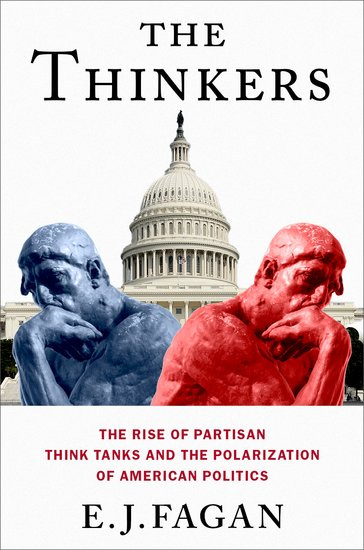I wrote a book!
The Thinkers: The Rise of Partisan Think Tanks and the Polarization of American Politics
Ever since at least High School, I’ve wanted to write a book. I’m proud to announce that my first book will be published on June 12th. You can buy it from Oxford University Press, Amazon, Barnes and Noble and wherever books are sold.
The Thinkers is not about baseball. When not writing about the Yankees, I am a political scientist. This book came out of my dissertation, which I began working on early in graduate school ten years ago. It examines some of the most powerful organizations operating in Washington, DC that most people have never heard of: partisan think tanks.
Partisan think tanks do not donate to campaigns or run ads. They don’t represent important constituencies. They don’t often pressure politicians through grassroots organizing or activism. Instead, their power comes from forming trusted relationships with elected officials and political parties as policy advisors and staff.
In many contexts, that relationship would be harmless. Elected officials are generalists. They only have the bandwidth to know a little bit about each of the vast array of issues that they need to consider in representing their constituents. They have always relied on close policy advisors and staff to be the real experts on public policymaking.
But, conservative ideologues realized that they could exploit this relationship. They saw that when their Republican allies relied on neutral experts in governmental, scientific and academic institutions, they tended to do things that conservatives objected to.
In 1973, three conservative Congressional staffers founded the Heritage Foundation to house and promote their own experts. Heritage quickly began enormously influential in conservative policymaking, shifting Republican elected officials far to the right. They were so successful that numerous imitators were founded shortly afterwards. Within a decade, conservatives developed their own alternative ecosystem of experts to translate conservative policy preferences in concrete policy.
The book follows four think tanks: Heritage and its rival American Enterprise Institute on the right and the newer Center for American Progress its lower-profile counterpart the Center on Budget and Policy priorities on the left. It places these think tanks in the middle of some of the biggest policy fights of the last two decades: the 2009 stimulus bill, the Affordable Care Act’s passage in 2010 and attempted repeal in 2017, the Tax Cuts and Jobs Act, the 2013 immigration reform bill and the debate over climate change.
The Thinkers also does some science. There are a fair number of books out there that paint these organizations—particularly Heritage—as the leaders of a vast conspiracy. Policy advisors are classic villain (see Wormtongue, Grima), but the story is more complicated. My primary scientific claim in this book is that political parties would be less polarized without partisan think tanks. My secondary claim is that some partisan think tanks produce lower-quality, biased information. You’ll have to read to decide if you are persuaded by the evidence. I sure am.
A lot of academic books are a real grind to read. Sometimes, that’s for good reason. Science is complicated, technical and specialized. I wouldn’t recommend most academic work to non-academics.
But I wanted to write a book that people would actually enjoy reading. The book makes a rigorous scientific argument, but I channeled every inch of my 19 years of blogging experience to make it fun to read at the same time. I tell a lot of stories about think tanks, policymaking and recent American political history, some of which have not been reported elsewhere. Most of the technical stuff, jargon and statistics are self-contained in the middle chapters and appendix.
If that all sounds good to you, I hope you check out The Thinkers: The Rise of Partisan Think Tanks and the Polarization of American Politics.



EJ. Congrats on finishing the book. I hope the market for political scientists who write team-specific baseball Substacks is quite good...and now working on my book.